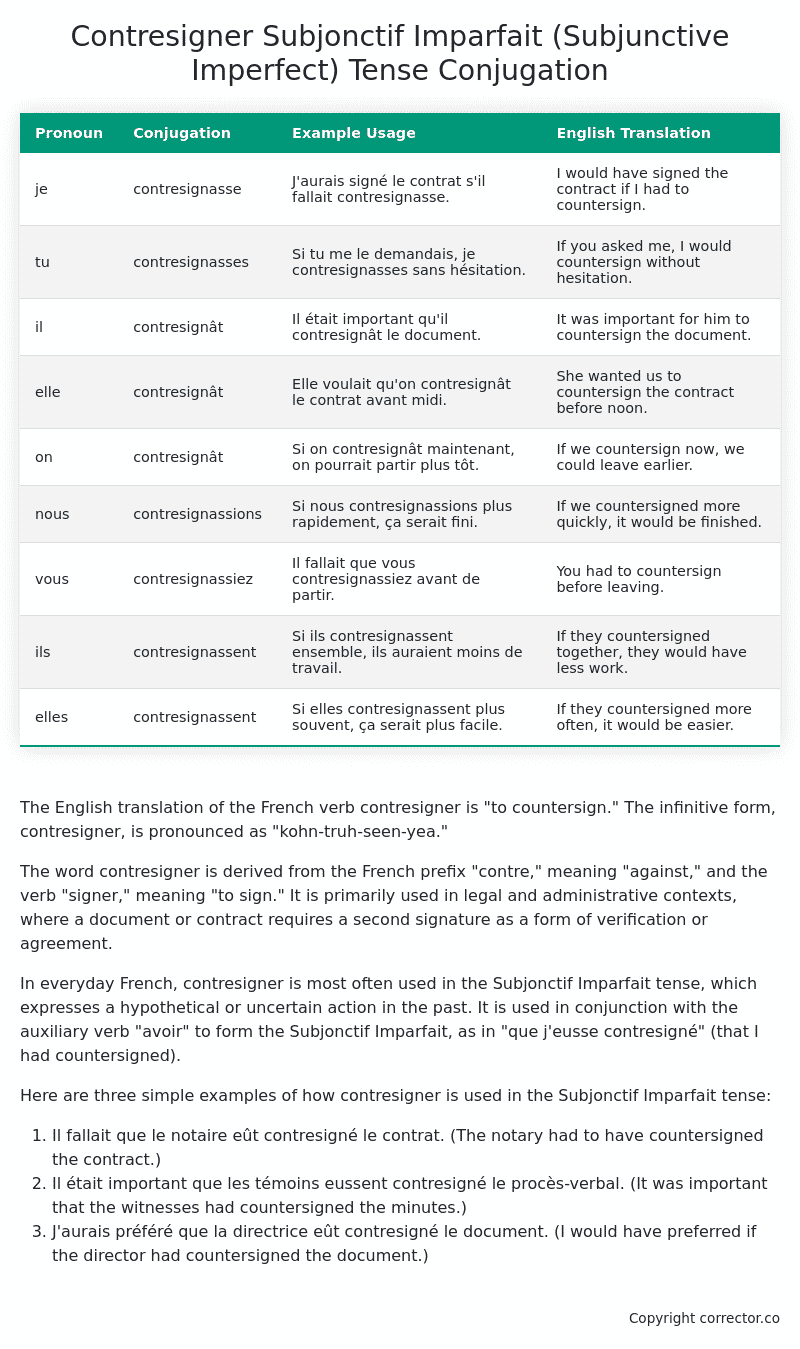Subjonctif Imparfait (Subjunctive Imperfect) Tense Conjugation of the French Verb contresigner
Introduction to the verb contresigner
The English translation of the French verb contresigner is “to countersign.” The infinitive form, contresigner, is pronounced as “kohn-truh-seen-yea.”
The word contresigner is derived from the French prefix “contre,” meaning “against,” and the verb “signer,” meaning “to sign.” It is primarily used in legal and administrative contexts, where a document or contract requires a second signature as a form of verification or agreement.
In everyday French, contresigner is most often used in the Subjonctif Imparfait tense, which expresses a hypothetical or uncertain action in the past. It is used in conjunction with the auxiliary verb “avoir” to form the Subjonctif Imparfait, as in “que j’eusse contresigné” (that I had countersigned).
Here are three simple examples of how contresigner is used in the Subjonctif Imparfait tense:
- Il fallait que le notaire eût contresigné le contrat. (The notary had to have countersigned the contract.)
- Il était important que les témoins eussent contresigné le procès-verbal. (It was important that the witnesses had countersigned the minutes.)
- J’aurais préféré que la directrice eût contresigné le document. (I would have preferred if the director had countersigned the document.)
Table of the Subjonctif Imparfait (Subjunctive Imperfect) Tense Conjugation of contresigner
| Pronoun | Conjugation | Example Usage | English Translation |
|---|---|---|---|
| je | contresignasse | J’aurais signé le contrat s’il fallait contresignasse. | I would have signed the contract if I had to countersign. |
| tu | contresignasses | Si tu me le demandais, je contresignasses sans hésitation. | If you asked me, I would countersign without hesitation. |
| il | contresignât | Il était important qu’il contresignât le document. | It was important for him to countersign the document. |
| elle | contresignât | Elle voulait qu’on contresignât le contrat avant midi. | She wanted us to countersign the contract before noon. |
| on | contresignât | Si on contresignât maintenant, on pourrait partir plus tôt. | If we countersign now, we could leave earlier. |
| nous | contresignassions | Si nous contresignassions plus rapidement, ça serait fini. | If we countersigned more quickly, it would be finished. |
| vous | contresignassiez | Il fallait que vous contresignassiez avant de partir. | You had to countersign before leaving. |
| ils | contresignassent | Si ils contresignassent ensemble, ils auraient moins de travail. | If they countersigned together, they would have less work. |
| elles | contresignassent | Si elles contresignassent plus souvent, ça serait plus facile. | If they countersigned more often, it would be easier. |
Other Conjugations for Contresigner.
Le Present (Present Tense) Conjugation of the French Verb contresigner
Imparfait (Imperfect) Tense Conjugation of the French Verb contresigner
Passé Simple (Simple Past) Tense Conjugation of the French Verb contresigner
Passé Composé (Present Perfect) Tense Conjugation of the French Verb contresigner
Futur Simple (Simple Future) Tense Conjugation of the French Verb contresigner
Futur Proche (Near Future) Tense Conjugation of the French Verb contresigner
Plus-que-parfait (Pluperfect) Tense Conjugation of the French Verb contresigner
Passé Antérieur (Past Anterior) Tense Conjugation of the French Verb contresigner
Futur Antérieur (Future Anterior) Tense Conjugation of the French Verb contresigner
Subjonctif Présent (Subjunctive Present) Tense Conjugation of the French Verb contresigner
Subjonctif Passé (Subjunctive Past) Tense Conjugation of the French Verb contresigner
Subjonctif Imparfait (Subjunctive Imperfect) Tense Conjugation of the French Verb contresigner (this article)
Conditionnel Présent (Conditional Present) Tense Conjugation of the French Verb contresigner
Conditionnel Passé (Conditional Past) Tense Conjugation of the French Verb contresigner
L’impératif Présent (Imperative Present) Tense Conjugation of the French Verb contresigner
L’infinitif Présent (Infinitive Present) Tense Conjugation of the French Verb contresigner
Struggling with French verbs or the language in general? Why not use our free French Grammar Checker – no registration required!
Get a FREE Download Study Sheet of this Conjugation 🔥
Simply right click the image below, click “save image” and get your free reference for the contresigner Subjonctif Imparfait tense conjugation!

Contresigner – About the French Subjonctif Imparfait (Subjunctive Imperfect) Tense
Formation
Common Everyday Usage Patterns
Interactions with Other Tenses
Subjonctif Présent
Indicatif Passé Composé
Conditional
Conditional Perfect
Summary
I hope you enjoyed this article on the verb contresigner. Still in a learning mood? Check out another TOTALLY random French verb conjugation!


